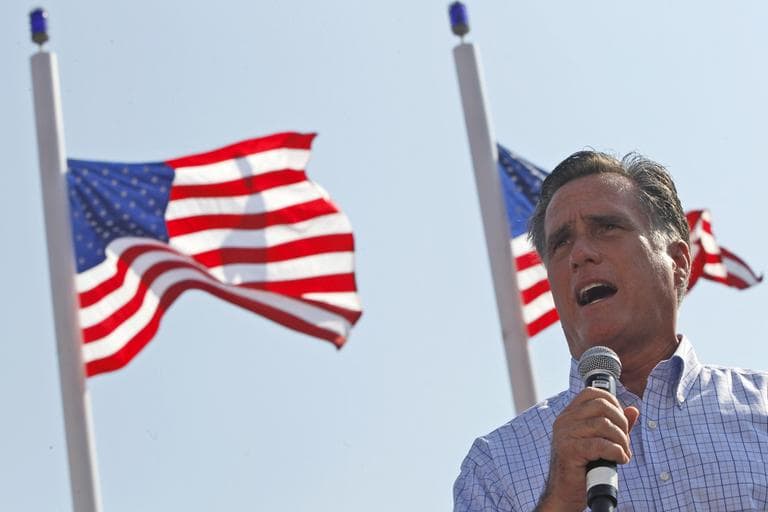Advertisement
Mitt Romney, The Velcro Candidate

Ronald Reagan was famously called the “Teflon president” because criticism didn’t seem to stick to him. Most people felt he was well-intentioned and principled so they followed the adage of Alexander Pope: “To err is human, to forgive, divine.”
Mitt Romney is a Velcro candidate. Voters believe a lot of the criticism of him but nearly half support him anyway because they think he’d do a better job than President Obama in reviving the economy, solving the debt crisis, and restoring confidence.
If voters didn’t think there was any validity to allegations that Romney was ruthless in business and opportunistic in politics, his likability ratings wouldn’t be so low and his negatives wouldn’t be so high. Yet he goes through periods of bad publicity and waves of attack ads with little or no dip in the polls. This of course aggravates his liberal critics. Perhaps they blame the voters, thinking that undecided voters in particular have such low expectations and are so cynical about politics they don’t care what a candidate said or did — only whether they are “better off now than four years ago.”
A lengthy anti-Romney article in Rolling Stone, “Greed and Debt: The True Story of Mitt Romney and Bain Capital," expressed the anger that many Obama supporters are evidently feeling. Matt Taibbi, author of the piece, chastised the news media for not being critical enough of Romney:
By making debt the centerpiece of his campaign, Romney was making a calculated bluff of historic dimensions — placing a massive all-in bet on the rank incompetence of the American press corps. The result has been a brilliant comedy: A man makes a $250 million fortune loading up companies with debt and then extracting million-dollar fees from those same companies, in exchange for the generous service of telling them who needs to be fired in order to finance the debt payments he saddled them with in the first place.
The “robber barons” kind of criticism doesn’t seem to have had as much impact as when Sen. Ted Kennedy used it in TV spots against Romney in their 1994 Senate race. The big difference between then and now — apart from the obvious fact that the Massachusetts electorate is far more Democratic than the nation as a whole — is the state of the economy. Many voters can accept the idea that Romney made his money the new-fashioned way, by leveraging it more than actually risking it, yet still believe he has the real-world experience and turnaround skills that would enable him to better incentivize job-creation and streamline the federal bureaucracy.
In addition to attacking Bain, Democratic surrogates have been going after his VP choice, Paul Ryan — and his new, unofficial running mate, Clint Eastwood. But the new targets serve as lightning rods for Romney. If Democrats are mocking Ryan for having to admit he overstated his finishing time in a marathon 20 years ago — ignoring the fact that Ryan’s opponent, Joe Biden, is notorious for gaffes and plagiarizing — Romney benefits. People vote for president, not vice president or celebrity endorser.
But Romney’s success as a Velcro candidate may have given his advisers a false sense of security and momentum. They gambled at the GOP convention that “vague is beautiful” would continue to serve the candidate well. He didn’t provide a big, bold plan or strategy for rejuvenating the economy, achieving energy independence, improving education, etc. Instead, they spent most of the convention’s prime-time infomercial on his bio and character, trying to improve his likability.
Sometimes a low-risk strategy turns out to be high-risk strategy. Driving in cruise control can be dangerous. If Romney wants to act like Thomas E. Dewey in the final two months, his opponent will be more than happy to play the part of Harry Truman, giving him hell.
But for now, Romney looks surprisingly strong. Granted, when you analyze the Electoral College math, he’s got a long way to go. But, poll-wise, it looks like the presidential race will continue to be close until the debates. Perhaps that’s when we’ll see a breakthrough performance that turns large numbers of indecisive undecideds into decideds.
In a 2008 Democratic debate before the New Hampshire primary, a panelist posed an unkind question to Hillary Clinton. He asked why, according to polls, voters liked Obama more. She said, tongue in cheek, “Well, that hurts my feelings. (Laughter) But I’ll try to go on.”
Regardless of attacks by speakers at the Democratic National Convention, Romney will continue to plow ahead, undaunted. Some criticism may stick, but it might not matter because he’ll still be the alternative to Obama. For half of the electorate, that means he is — to use Obama’s retort to Hillary in that debate — “likable enough.”
This program aired on September 5, 2012. The audio for this program is not available.
